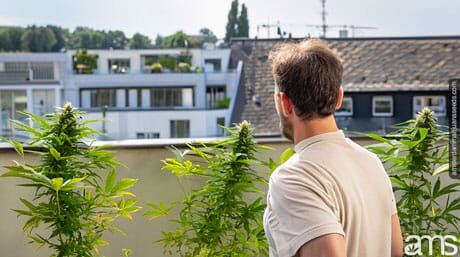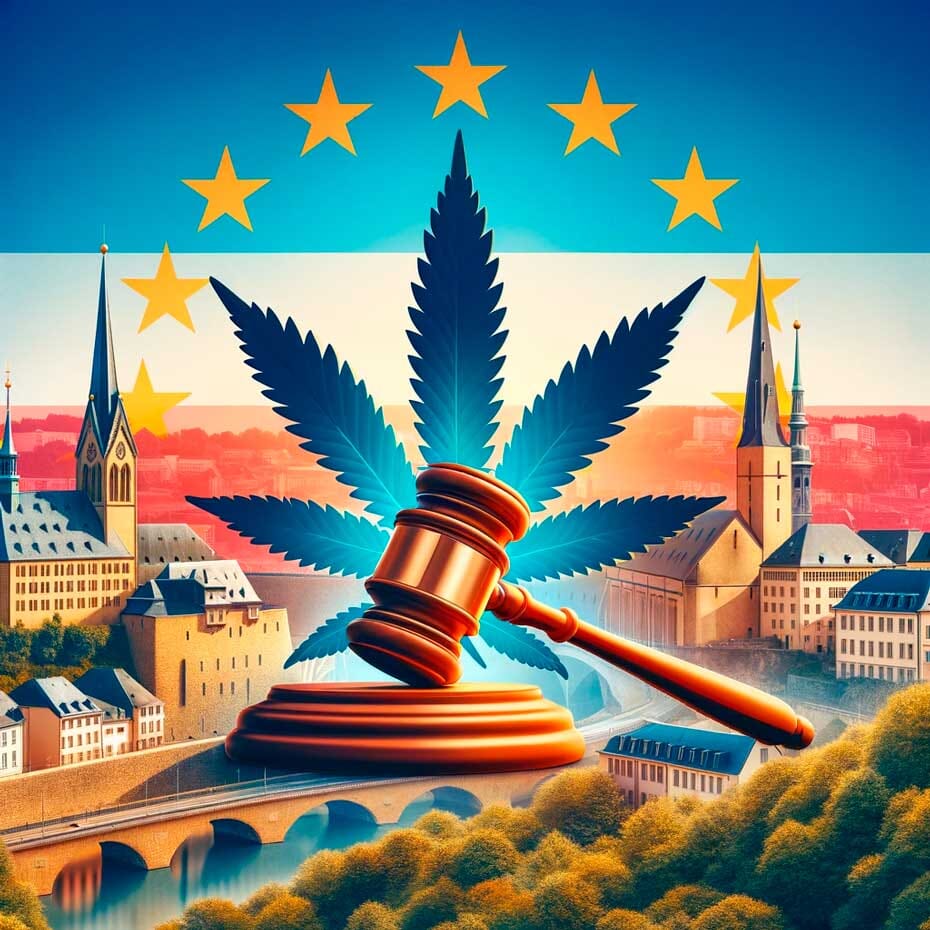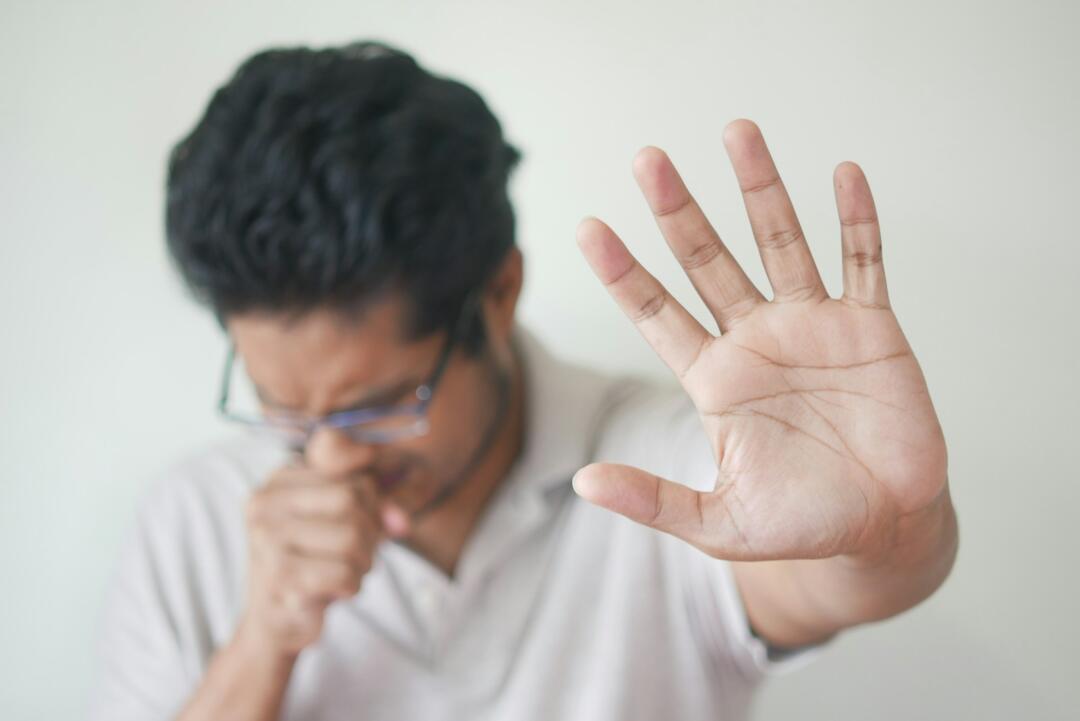In the heart of Europe, Luxembourg, a country renowned for its scenic landscapes and rich history, has recently taken a path-breaking step by legalizing the personal use of cannabis. This monumental change, the first of its kind in the European Union after Malta, marks the end of cannabis prohibition in Luxembourg and opens up an entirely new chapter in the nation’s story.
One of the leading voices in this historic shift is Ludwig, a fervent cannabis activist living on the outskirts of Luxembourg City. His passion for cannabis legalization, coupled with his knowledge and firsthand experience, has established him as a respected figure in the cannabis activism community.
The Journey to Legalization in Luxembourg
Much like the plant’s growth itself, was a process that required time, patience, and the right conditions to take root. It started in 2021 when the ministers of justice and homeland security planted the seed by proposing a bill that would allow adults to possess and cultivate cannabis for personal use. This was a daring proposal at the time, challenging the long-standing norms and raising a host of complex legal, social, and public health issues.
Navigating the intricate labyrinth of legislative proceedings, the proposal underwent a two-year deliberation period. It was a time marked by comprehensive discussions, intense debates, and in-depth analysis of the potential implications of such a policy shift. The goal was to create a balanced framework that recognized personal freedoms while ensuring public safety. Policymakers consulted with experts from various fields, including public health, law enforcement, and social services, to weigh the potential benefits and drawbacks of such a move.

Finally, after these exhaustive discussions and considerations, the legislation was brought forth for a vote in 2023. In a compelling demonstration of democracy, 38 MPs voted in favor, while 22 voted against it. The parliamentary vote was a reflection of the wider societal shift in perceptions towards cannabis use. The approval signaled a broader recognition of the need for reform and a willingness to engage in progressive drug policies. It also underscored the country’s readiness to prioritize harm reduction and personal freedom over punitive approaches to drug use.
The new law struck a careful balance between personal liberties and societal safeguards. It allows adults in Luxembourg to possess, consume, and cultivate up to three grams of cannabis. It also permits the growth of up to four cannabis plants within a secure location in private residences, providing an avenue for self-sufficiency and personal control over the product.
This provision was designed to ensure the secure cultivation of cannabis and minimize potential issues such as theft or unauthorized access, particularly by minors. Additionally, allowing home cultivation helps counterbalance the illicit market by providing a legal, regulated alternative. It also encourages responsible use by allowing individuals to have control over the quality and origin of their cannabis.
The legislative victory in Luxembourg was not just a win for the country but also for Europe. As the second EU member state to legalize cannabis for personal use, Luxembourg’s decision has sparked a broader conversation about drug policy reform in the region. It has challenged other countries to reconsider their stance on cannabis use and explore the potential benefits of a regulated approach.
The legalization journey in Luxembourg, marked by thoughtful deliberation, democratic decision-making, and a commitment to personal liberties, sets a valuable precedent. It illustrates how open dialogue, careful consideration of societal and individual needs, and respect for personal freedom can lead to progressive policies that reflect the evolving attitudes of the 21st century.
Ludwig’s Role as a Cannabis Activist
As an occasional cannabis user, Ludwig embodies the spirit of change and progress that this legislation represents. His belief in the numerous benefits of cannabis and the importance of personal freedoms fuel his passionate advocacy.
His advocacy goes beyond personal use and cultivation. Ludwig is adamant about informing and educating the public about cannabis, its potential benefits, and associated risks. He is a strong proponent of responsible and safe use, highlighting the importance of education in achieving this. Ludwig’s firsthand experience combined with his depth of knowledge about cannabis makes his perspective uniquely valuable.
His enthusiasm and dedication to the cause are reflected in his eloquent discourse, engaging storytelling, and candid sharing of his personal experiences. Whether it’s his blog followers, local community members, or fellow activists, those who engage with Ludwig’s content often come away feeling well-informed and satisfied with their learning experience.
The Wider Impact of Cannabis Legalization
The recent legalization of cannabis in Luxembourg signifies more than a simple change in legislation or societal attitudes towards cannabis use; it heralds a paradigm shift with far-reaching implications. This move by the Grand Duchy sets a powerful precedent, not just for the EU member states, but also for countries across the globe. It creates a ripple effect, challenging the status quo, and compelling nations to revisit their own laws concerning cannabis use.
The legal status of cannabis varies significantly worldwide. While many nations maintain strict prohibitionist policies, others, such as Canada and Uruguay, have already fully legalized it. Some have decriminalized possession while maintaining strict rules on its distribution and cultivation. However, Luxembourg’s decision adds a compelling voice to the chorus advocating for a more regulated, rather than prohibited, approach to cannabis. This new perspective favors responsible use over outright denial, and harm reduction over criminal punishment, allowing the focus to shift from penalization to education and prevention.
A regulated cannabis market brings multiple potential benefits at societal and economic levels. By legalizing cannabis, governments can exert control over its quality and safety, reducing the risks associated with unregulated, illicit markets. Such control would ensure that consumers are receiving a product that meets health and safety standards, thereby reducing the potential for harm. Furthermore, through mandatory labelling and packaging rules, consumers can be better informed about what they are consuming, allowing them to make safer and more responsible choices.

Another benefit is the significant reduction in the burden on the criminal justice system. The decriminalization of cannabis possession and cultivation can decrease the number of non-violent drug offenders in prisons, leading to considerable savings in enforcement costs. This could free up resources to tackle more serious crimes, enhancing overall societal security.
Moreover, the legalization of cannabis paves the way for an entirely new industry, opening up potential avenues for economic growth and job creation. The legal cannabis market, encompassing cultivation, distribution, and retail, can be a source of significant tax revenue. These funds could be reinvested into the community, improving public services such as education, healthcare, and infrastructure.
Perhaps one of the most significant potential benefits of cannabis legalization is the facilitation of research. The strict legal status of cannabis in many parts of the world has been a considerable obstacle to scientific research. With legalization, researchers can conduct more extensive studies into the potential medicinal uses of cannabis without legal hindrance. This could lead to novel therapies for a variety of medical conditions, enhancing the scope of healthcare and treatment options.
While celebrating this landmark decision, advocates like Ludwig continue their mission to educate, empower, and enlighten those interested in the world of cannabis. It’s not just about enjoying the newfound freedom but about navigating this terrain responsibly and knowledgeably. Their emphasis on education is pivotal in fostering a society that not only tolerates cannabis use but understands and respects it.
The personal legalization of cannabis in Luxembourg is indeed an historic moment – a bold step towards understanding, acceptance, and personal freedom. However, it is also the start of a new journey, one that requires continued efforts to educate and enlighten society about responsible cannabis use. As this story continues to unfold, Ludwig, armed with his passion and knowledge, stands ready to guide individuals every step of the way. With a fine balance between freedom and responsibility, the path towards a more accepting society is being paved, where personal choice is respected, and understanding trumps prejudice.
Embracing Freedom: A Future Visit to Luxembourg
In the light of Luxembourg’s progressive steps towards cannabis legalization, envisioning a future trip to this enchanting country takes on a new hue. This new law affords visitors the unique opportunity to partake in the freedom of enjoying marijuana, this splendid gift from mother nature, without legal hindrance.
Imagine strolling through the picturesque streets of Luxembourg City, the air filled with the vibrant energy of change and acceptance. Perhaps you decide to retreat to the comfort of your private residence, where you can now legally enjoy the calming effects of cannabis. As you light up, there’s a sense of liberation, a tangible testament to the nation’s bold stride towards personal freedom. You inhale deeply, absorbing not just the unique blend of flavors but also the rich history of advocacy and perseverance that led to this moment.
Each puff serves as a tribute to the diligent work of activists like Ludwig and the foresighted lawmakers who dared to challenge the status quo. As the pleasant aroma mingles with the crisp Luxembourg air, you appreciate the plant’s natural essence, a product of mother nature that has now found its rightful place in Luxembourg’s societal fabric. Your visit to Luxembourg is not just a tourist journey anymore; it’s a first-hand experience of a groundbreaking shift in societal norms and attitudes.

However, as you relish this newfound freedom, you’re also mindful of the responsibility that comes with it. You remember the efforts of Ludwig and others who strived to ensure that this liberty is enjoyed with a clear understanding of the substance and respect for its potential impacts. This experience is not just about personal enjoyment; it’s a celebration of the triumph of understanding over ignorance, acceptance over stigma, and personal freedom over unfounded fear.
The next time you visit Luxembourg, you’ll be stepping into a nation that’s bravely redefining its approach to cannabis. It’s a testament to Luxembourg’s progressive spirit and a beacon of hope for other nations watching this transformation. This newfound freedom is not just a victory for cannabis enthusiasts; it’s a win for advocates of personal freedom and societal progress. So, whether you choose to enjoy cannabis or simply soak in the historic significance of this shift, your next visit to Luxembourg promises to be a unique and memorable experience.















































